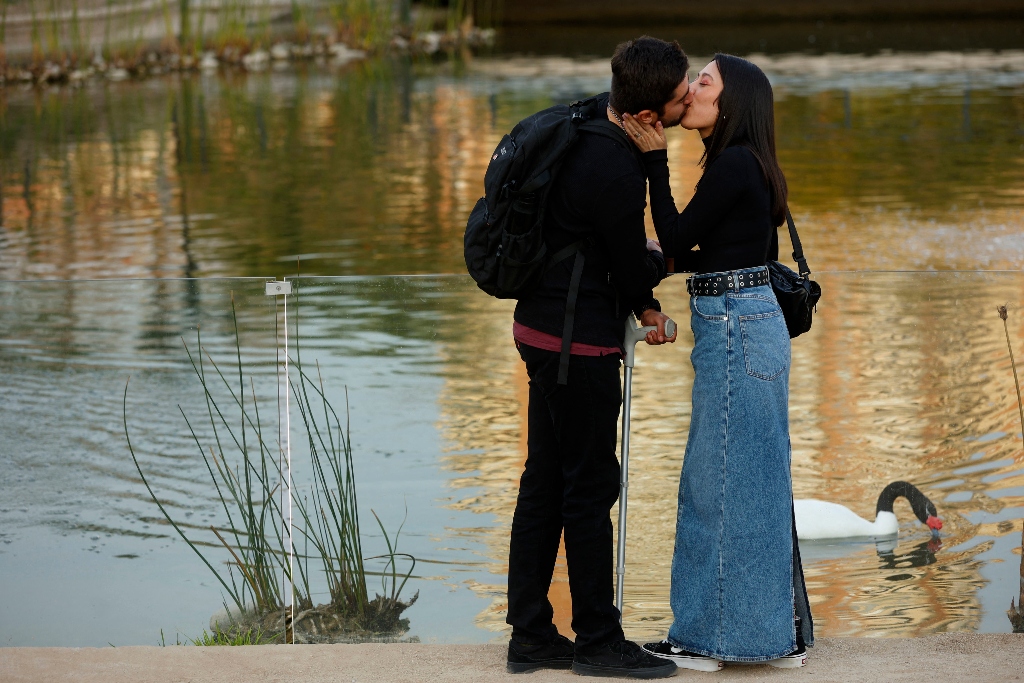
Mahatma Gandhi once said, “Where there is love, there is life,” and no truer words have ever been said about it.
Though he probably meant it as an instrument for social transformation during his fight for India’s independence, love is still a powerful and complex emotion that gives a sense of meaning and purpose in our lives.
Love makes everything taste as sweet as candy and feel as if you are flying in the sky. Love is what keeps you smiling all day and turns the whole world beautiful. But enough of quoting TWICE’s hit K-pop song “What Is Love?” — we are here to discover what love is from a more education-based perspective and its connections to a person’s psychology.

Robert Sternberg’s triangular love is one of the more popular theories of love and psychology. Source: AFP
The interesting psychology of love
Scientists and researchers have proposed several different theories of love and psychology. A popular one is Robert Sternberg’s triangular theory of love, which comprises intimacy, passion, and commitment.
Intimacy is the aspect of love that causes individuals to feel connected to one another.
Passion is both a tender romance and a raw sexual attraction.
Commitment, in the short term, is the decision to remain together; and in the long term, wanting to share achievements, experiences, and plans made with that other person.
According to Stenberg, these components create seven forms of love.
- Liking: The perfect example of this love type is friendship, where you share a connection without any physical passion or commitment.
- Infatuation: This is where you are physically attracted to someone but have no emotional intimacy or established commitment. Love at first sight usually falls under infatuation.
- Empty: A relationship that lacks passion or intimacy. This is a love that has lost its spark.
- Romantic: Being romantically involved with someone means being physically passionate and emotionally intimate. However, you have not made any long-term commitments yet.
- Companionate: This relationship is especially common among older couples and family members. No passion is found, but both are committed and emotionally connected.
- Fatuous: Love like this is impulsive. It describes a connection based on each other’s attraction without common ground.
- Consummate: This love type checks all the boxes: commitment, passion, and intimacy.

Today’s generation would rather remain single or unmarried. Source: AFP
The pros of remaining single
Today’s generation finds love too complicated and would rather remain single or unmarried.
There are just too many demands when seeking a partner.
Global relationships insight expert for Tinder and author of “Find Love: How to Navigate Modern Love and Discover the Right Partner for You,” Paul Brunson, believes that finding and keeping love today is harder than ever in human history.
In an interview with the BBC, Brunson said that the many variations of what is considered an acceptable relationship have made finding a partner that matches your wants even more challenging. “You can be monogamous or in a polyamorous relationship, living together or living apart – there are dozens and dozens of acceptable forms,” he says.
Not only that, we demand more from our partners than ever before. Brunson cites psychologist Eli Finkel’s research — now, humans have reached a point of “self-evolution.”
“We are searching for everything out of our partner,” said Brunson. “We want them to be our intellectual equal, we want them to be the CEO of the business that we launch, we want them to be a great co-parent, we want them to be a phenomenal sex partner.”
The National Centre for Family & Marriage Research at Bowling Green State University notes the US marriage rate has decreased by 54% from 1900 to 2024, a worrying decline for the country. In China, the number of people getting married fell from approximately 13.5 million couples annually in 2013 to approximately 6.8 million in 2022.
Now that singlehood is no longer unconventional and considered more socially acceptable than in the past, adults today opt out of being in love because of the freedom which allows them to focus more on themselves.

There’s been a rise of singlehood worldwide, and no one seems to be complaining about it so far. Source: AFP
They are putting their needs first before everyone else’s, and it goes beyond occasional pampering or relaxation.
It is about being the best version of yourself physically, emotionally, and in this economy, financially. Debt.org reports that 21% of single people had credit card debt, compared to 27% of married couples without children and 36% of married couples with children.
Some might even say that being in a relationship distracts them from their life goals, especially for students still pursuing a degree.
A study from the Islamic University in Uganda found that undergraduate students engaging in romantic relationships experienced a decrease in their GPA.
It suffices to say that love, in any form, is tricky — but like most things in the world, there’s always a course out there for it.
Granted, there isn’t a specific field that tackles love per se but there are many academic disciplines and job descriptions that delve into the complexities of human relationships and emotions – both integral components of love and psychology.
Degrees that let you explore the breadth and depth of love

Psychologists explore the cognitive, emotional, and behavioural aspects of human relationships. Source: AFP
Psychology
The most obvious degree that explores love is psychology. Psychology students explore the cognitive, emotional, and behavioural aspects of human relationships, including love, attraction, and attachment.
This is done through scientific methods and the use of statistics to find patterns in human behaviour. Other than just explaining human behaviour, psychologists also use their expertise to offer support and generate positive change. This can cover topics such as relationships and love too.
Sociology
A degree in sociology is the scientific study of people and their societies. It investigates how they are formed and what they may become in the future.
Sociologists can study love within these social contexts. This includes examining cultural norms, societal expectations, and how relationships are influenced by broader social structures.
Philosophy
A degree in philosophy explores the difficult questions of love, like what it is and whether it is a rational or irrational feeling. It delves deep into the nature of love and psychology, its meaning, and its role in human existence.
This degree hones your ability to reason and argue effectively. It improves logical and critical thinking, which is needed for a complicated topic such as love.
Anthropology
A degree in anthropology examines the various ways that human beings occupy the world and how different cultures, languages, and histories shape human diversity.
In terms of love and psychology, it explores the meaning across different cultures, comparing and contrasting how love is expressed, understood, and valued in various societies.
Literature
Literature mainly focuses on analysing, debating, and critically theorising published novels, poetry, and other forms of writing. While it can cover lots of topics, studying literature can also explore the complexities of love and insights into the human experience.
Love guru-esque careers to explore

Emily Henry is a famous romance author who writes about love and psychology through fictional stories. Source: AFP
Couples therapists
Average yearly salary: US$77,000
A couples therapist is the ultimate love guru. They help couples and families improve their relationships, addressing issues like communication, conflict resolution, and intimacy.
They find solutions to bring back or ignite the spark between two individuals, which some couples might need in their relationship.
Social workers
Average yearly salary: US$76,000
A social worker’s job is to promote social change and development. While this could involve a lot of people, couples and families are one of their primary target audiences as they address social issues that can impact relationships, such as poverty, abuse, and mental health.
Romance authors
Average yearly salary: US$84,000
Emily Henry, Jane Austen, and Nora Roberts are famous romance authors responsible for making us believe true love exists.
These writers explore the theme of love in their work, expressing their understanding of human connection and emotion through fiction. “Funny Story”, “Pride and Prejudice”, and “Jewels of the Sun” are some romance novels that cover everything there is about love.
Artists
Average yearly salary: US$59,000
“The Kiss” by Gustav Klimt, “We Rose Up Slowly” by Roy Lichtenstein, and “LOVE” by Robert Indiana.
These artworks depict love in an abstract medium that can be interpreted in many ways according to your understanding of art. It could also be a form of social commentary that challenges the meaning of love and psychology, forcing you to come up with your own conclusion.










